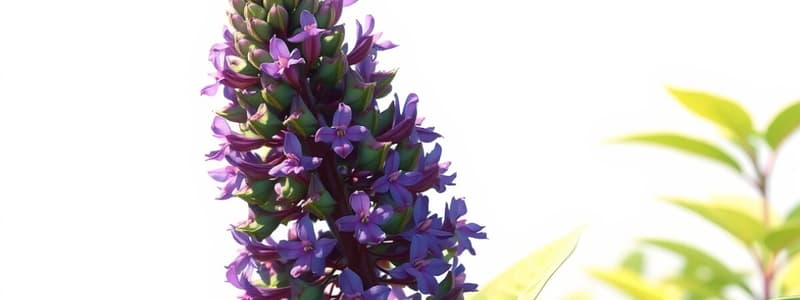Podcast
Questions and Answers
What is the significance of Blumea balsamifera in treating wounds and other ailments?
What is the significance of Blumea balsamifera in treating wounds and other ailments?
Blumea balsamifera is used for treating wounds, cuts, rheumatism, colds, coughs, and diarrhea due to its anti-inflammatory and analgesic properties.
How does the herbal plant TSAANG GUBAT help in managing skin allergies and other conditions?
How does the herbal plant TSAANG GUBAT help in managing skin allergies and other conditions?
TSAANG GUBAT, or Ehretia microphylla, is effective for treating eczema, scabies, and can alleviate symptoms of psoriasis through its anti-inflammatory properties.
In what way can Pansit-pansitan contribute to kidney health?
In what way can Pansit-pansitan contribute to kidney health?
Pansit-pansitan, or Peperomia pellucida, is known for its effectiveness in treating kidney stones as it possesses diuretic properties that help in flushing out kidney impurities.
What is the recommended preparation and dosage for using Blumea balsamifera for diarrhea?
What is the recommended preparation and dosage for using Blumea balsamifera for diarrhea?
What are the anti-helmintic properties of Niyog-niyogan and how should its seeds be used?
What are the anti-helmintic properties of Niyog-niyogan and how should its seeds be used?
What properties make herbal plants effective for pain relief?
What properties make herbal plants effective for pain relief?
What herb is commonly used for treating kidney stones, and what is its scientific name?
What herb is commonly used for treating kidney stones, and what is its scientific name?
Identify a plant used for pain relief and describe how its leaves are prepared for treatment.
Identify a plant used for pain relief and describe how its leaves are prepared for treatment.
How is Lagundi prepared for treating asthma, cough, and fever?
How is Lagundi prepared for treating asthma, cough, and fever?
What are the suggested uses of Lagundi for skin allergies such as dermatitis and scabies?
What are the suggested uses of Lagundi for skin allergies such as dermatitis and scabies?
Flashcards are hidden until you start studying
Study Notes
Scabies Treatment
- Apply treatment twice daily until scabies symptoms heal.
- Consult a doctor if symptoms persist or if there's a sudden change in condition.
Lagundi (Vitex negundo)
- Commonly used in the Philippines for wounds and pain relief for centuries.
- Leaves alleviate headaches and cleanse ulcers.
- Seeds treat skin diseases; flowers address conditions like diarrhea and cholera.
- Dried black fruit relieves intestinal discomfort.
- Roots used for skin ailments including dermatitis and scabies.
Lagundi Preparation
- For asthma, cough, and fever: Boil raw fruits or leaves in two glasses of water for 15 minutes.
- For dysentery, colds, and pain: Prepare decoction using a handful of leaves and flowers.
- For sprains, contusions: Pound leaves and apply to affected areas.
- For skin diseases: Wash and clean the skin or wound with Lagundi.
Niyog-niyogan (Quisqualis indica)
- Also known as Chinese honeysuckle, it effectively eliminates intestinal worms such as Ascaris and Trichina.
- Can be used to treat headaches.
Niyog-niyogan Preparation
- Seeds are taken two hours after supper for deworming; may repeat dose after one week if no worms are expelled.
- Not recommended for children under four years old.
Sambong (Blumea balsamifera)
- Wild aromatic shrub from tropical climates, including the Philippines.
- Known for treating kidney stones and wounds, and offers benefits for rheumatism and colds.
Sambong Preparation
- For anti-edema and diuretic effects: Boil chopped leaves in a glass of water for 15 minutes; consume over the day.
Tsaang Gubat (Ehretia microphylla)
- Also known as wild tea, used for skin allergies like eczema and itchiness post-childbirth.
- Contains properties that may alleviate mild psoriasis.
Tsaang Gubat Preparation
- For diarrhea: Boil chopped leaves in two glasses of water for 15 minutes; divide into four parts and drink one part every three hours.
- For stomachache: Boil chopped leaves in one glass of water for 15 minutes, then cool and strain.
Ulasimang Bato (Peperomia pellucida)
- Often used in salads and beneficial for treating arthritis and gout.
- Effective against multiple health conditions including abscesses and kidney stones.
Ulasimang Bato Preparation
- Lower uric acid: Boil one and a half cups of leaves in two glasses of water over low heat; divide into three doses.
Yerba Buena (Clinopodium douglasii)
- An ancient household remedy in the Philippines, effective against body aches including rheumatism and gout.
- Addresses toothaches and other types of pain.
Yerba Buena Preparation
- For general pain relief: Boil chopped leaves in two glasses of water for 15 minutes, dividing into two doses.
- For cough and cold relief: Steep 10 fresh leaves in hot water and drink as tea.
- For swollen gums and toothaches: Use appropriate preparations for gargling or apply sap directly.
Herbal Medicine Usage Reminders
- Avoid insecticides on plants to prevent poison contamination.
- Use clay pots for boiling herbal medicines without covers at low heat.
- Follow correct dosing and utilize only the part of the plant indicated.
- Administer only one type of herbal plant per condition and cease use if adverse reactions occur.
Studying That Suits You
Use AI to generate personalized quizzes and flashcards to suit your learning preferences.

